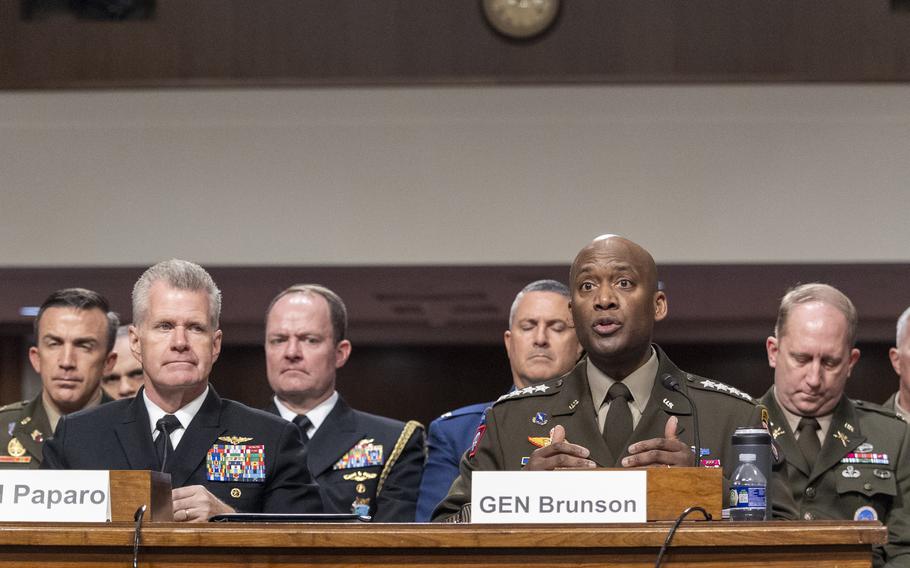
Adm. Samuel Paparo, commander of U.S. Indo-Pacific Command, left, and Army Gen. Xavier Brunson, commander of U.S. forces in Korea, testify Thursday, April 10, 2025, during a Senate Armed Services Committee hearing. (Eric Kayne/Stars and Stripes)
WASHINGTON — The commanders of U.S. forces in the Indo-Pacific region said Thursday that the presence of American servicemembers in South Korea helps deter a North Korean invasion and a potential troop withdrawal would be “problematic.”
Their comments to the Senate Armed Services Committee follow reports that officials in the Defense Department are considering reducing the U.S. military presence on the Korean Peninsula to focus on homeland defense and the threat from China.
Some 28,500 U.S. military personnel are stationed in South Korea to help keep the peace in the region in the aftermath of the Korean War.
Losing them would mean “there is a higher probability” that Kim Jong Un, North Korea’s leader, would invade South Korea, Adm. Samuel Paparo, commander of U.S. Indo-Pacific Command, said in testimony to the committee.
“Inherently, it would reduce our ability to prevail in conflict,” he said.
Army Gen. Xavier Brunson, the commander of U.S. forces in Korea, said reducing the force, which he called the right size at its current troop level, would be “problematic.”
“I won’t speak to policy but what we do provide there is the potential to impose costs in the East Sea to Russia, to impose costs in the West Sea to China and to continue to deter against North Korea,” he said.
The troops stationed on the peninsula are also a “critical component” to ballistic missile defense in the region, he said. North Korea launched 47 ballistic missiles in 2024.
“They are a critical portion of helping the INDOPACOM command see, sense and understand in the North and to deter a great many adversaries,” Brunson said of American personnel.
The Pentagon has not announced plans to change the force posture in South Korea but senators on Thursday said they were concerned by rumors that troops there will be redeployed elsewhere.
President Donald Trump has over the years called for the removal of American service members from South Korea, saying the country does not pay its fair share for the stationing of U.S. forces.
Brunson said South Korea contributed close to $1 billion in support for the U.S. military in the past fiscal year and provides about $500 million every year for construction, including additional towers for family housing and a new school at Camp Humphreys.
The U.S. is also utilizing South Korean shipyards to complete ship maintenance, he said. USNS Wally Schirra, a dry cargo ship, recently became the first U.S. naval vessel to undergo a large-scale overhaul at a South Korean shipyard.
“There is a lot that we get,” Brunson said of the military’s relationship with South Korea. “Some of it is fiscal and monetary, others of it is materiel and that’s irreplaceable.”
He noted the American economy is also heavily intertwined with South Korea’s, with 2,100 U.S. companies tied to the country and 450,000 jobs.
Paparo said it was essential to continue a strong security partnership with the nation.
“[Kim Jong Un]’s intentions could shift with the wind and he’s built a military that is designed to impose tremendous costs directly on South Korea,” he said. “It’s very important we maintain that deterrent posture.”